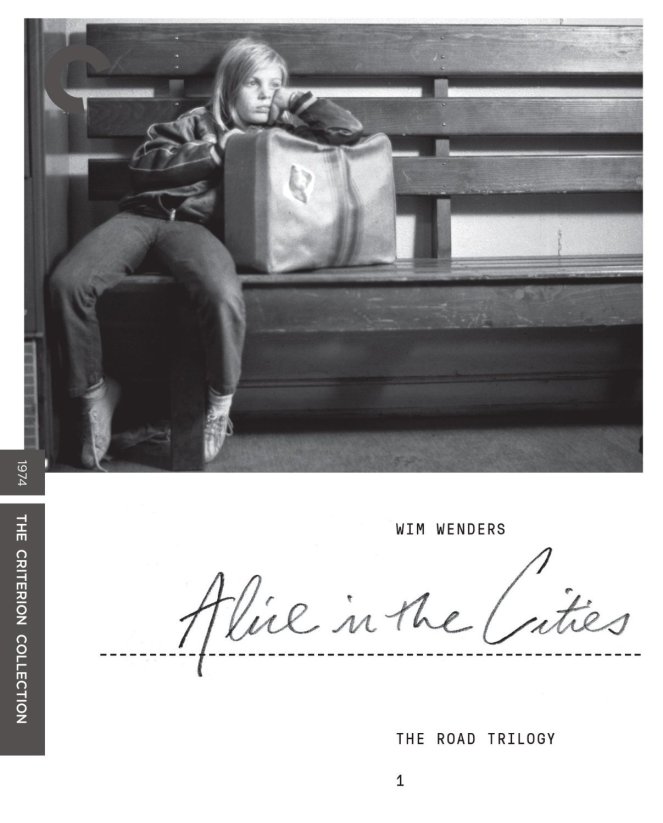
#814 Alice in the Cities
1974 // Germany // Wim Wenders
Criterion Release Date: 31 May 2016 (LINK)
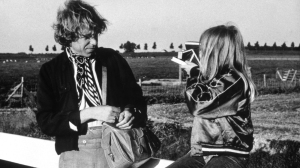
A single mother left her nine-year-old daughter at the hand of a stranger young man, a man whom she just met the day before, and disappeared in New York City with a short notice of instruction. The plot could be unfolded as mysterious thriller or adult-and-child bonding story, maybe like the one with Natalie Portman and Jean Reno in Léon: The Professional (1994), or the original idea that Wenders had but coincided with in Peter Bogdanovich’s Paper Moon (1973). In contrary, Wim Wenders, the director of Alice in the Cities, chose to go through a more spiritual and meditative narrative with the premise.
On a closer look, the narrative is secondary in Alice in the Cities. The episodic, consistently inconsistent narrative structure is the vehicle of a uncertain life one could experience from day to day. Images and shots nonfunctional in propelling the story forward were included in the film as they were existed in the that time and space. Like Easy Rider (1969) or Two-Lane Blacktop (1971), Alice in the Cities is the kind of “Road Movie” that took an unconventional trip on American culture (more on counter-culture actually), but the latter was from the perspective of an outsider, a German.
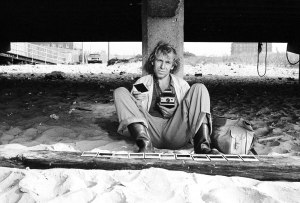
Although the film title only included one character’s name (the nine-year-old girl Alice), the film basically followed the eyes of another character, the German journalist Phillip Winter (Rüdiger Vogler). On his road trip across California to New York City for his essay on American landscape, instead of articulation with words his employer expected, he was only capable of snapshot with his Polaroid camera. From the opening scene on the Rockaway Beach to the Empire State Building, from the crowded cafe to the lonely motel room, the overwhelming images of American entranced and overloaded his hearts and minds. “It just never shows what you saw”, the comment from Winter after he took a photo of the grocery store in the midst of his road trip was the voice of Wenders, it is the central theme of constant struggle in finding the truth and documenting the reality with images.
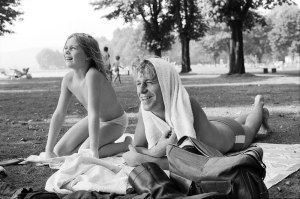
Wenders utilized the film protagonist as his alter-ego to express his concern on commercials and television, the engulfing images that somehow I felt he both loved and hated. There was a scene in the motel room where Winter broke the television set during the commercial break of a film broadcast (John Ford’s Young Mr. Lincoln; Ford’s name would come back at the end of the film in the form of newspaper article about his death), suggesting an outrageous or fed-up feeling on such sense-numbing technology. This could easily be transposed to the modern days, with the replacement of television with mobile phones. But the existential crisis of Winter would soon be pushed behind (or solved?) by a more immediate trouble: taking care of the nine year-old Alice (Yella Röttlander).
Winter met Alice and her mother (Elisabeth Kreuzer) when he decided to leave America for good, as the flights to Winter’s home country were cancelled during strike, an unexpected detour to Amsterdam bought them together. After a short night in hotel, Alice’s mother left Alice to Winter and a notice, claimed to meet them up in the Empire State Building, then (on the second notice) at Amsterdam later. The intentionally vague characters’ background (we basically learnt nothing of Winter’s pre-American period, or any concrete reason Alice’s mother left suddenly) was another narrative punctuation that showed the difference between filming a journey and telling a story. Here, we deduce that Alice’s mother prioritized her man over her child without ever criticizing that behaviour, as the emphasis was always put on the action (sometimes non-action, in the case of Winter not blaming Alice’s mother ever before Alice) of Winter. We were dropped in the middle of a character’s journey, and left without the story closed.
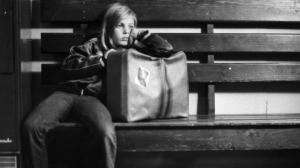
Like other Wenders’ films afterwards, for instance Paris, Texas (1984), the locations (i.e. “the cities”) were as important as the characters and their journey, which was comprised of both movement and stasis. The stay and sight-seeing in New York and Amsterdam were static thematically, in contrast to the searching of Alice’s grandmother in Wuppertal, where camera shots were focused on the moving cars or taken from the car’s perspective. Nonetheless, the relationship between Winter and Alice was always evolving. At first, taking care of Alice was an unwanted, or at least an unexpected trouble from Winter’s point of view. But except providing basic needs of eat and sleep, they acted more like equal companions rather than a surrogate father and daughter. The journey itself became a purpose of Winter who was a lost person when left America. Such formation of bonding could be easily seen again in Paris, Texas with a blood-related father and son relationship, where the dramatization of the last act in that film did strike the chord of my heart more than in Alice in the Cities, which kept its episodic narrative till the end. The end came a bit obtrusive and unearned, but as the camera pulled off from Winter and Alice on a moving train, that’s where their real journey began. The film ended but they were always moving on.

One thought on “#814 Alice in the Cities (1974)”